Finland has achieved so much by nourishing democracy that it is hard to believe it could be reversed. It has built an accountable and functioning state administration, it supports equality between its citizens and believes in power of education. We do not see better alternatives.

We spoke with H.E. Pertti Juhani IKONEN, Finnish Ambassador in Serbia about the building blocks of the Finish democracy, which proved to be resilient in spite of challenges for more than 100 years. The centennial is marked by altogether more than 2 000 events and projects in Finland and internationally. The absolute peak of Finish centenary celebrations in Belgrade was Tero Saarinen Company’s performance in the Belgrade Dance Festival on 1st of April.
In 2017, Finland celebrates 100 years of independence and democracy. How strong is Finnish democracy in today’s world where democracy is strongly challenged in many places?
In Finland, uninterrupted democracy has lasted for over 100 years, which means that we are very accustomed to it. What keeps our democracy strong and alive is a constant and open discussion on how we can do things better. Therefore, within our program for marking the centennial, a number of Finland 100 projects is assessing the state of democracy in Finland and pursuing new ways to participate and exert influence. We know that democracy is a never-ending process.
What are the building blocks of Finnish society that secured resilience of the country?
Democracy, as we just mentioned, plays a key role, and not only in its procedural form but the one nourishing equality and fairness in the society. We have built an accountable and functioning state administration, providing high-quality services to all of its citizens on the basis of equality between the citizens. Finally, our belief in the power of education is the cornerstone of our success in practically all fields; Finland is a genuinely knowledge-based society.
“Together” is the theme of the Suomi Finland 100 celebrations, showing that everyone is welcome to take part. Do you think that multicultural concept is still alive in Europe?
Of course it is alive, with all the challenges it has encountered. However, throughout the last few years, it has become clear that we need to search for new solutions best suited for given circumstances. I do not see other alternatives. We have achieved so much with this concept that it is hard to believe it could be reversed and to advocate for isolation within national borders. Today’s world is too dynamic for that.
The centennial will be marked by altogether more than 2 000 events and projects in Finland and internationally. Which of them you would like to highlight?
My favorite project in Helsinki is the dance of the icebreakers that will be performed on 6th December 2017, on our Independence Day. When we are talking about Belgrade, the absolute peak of our centenary celebrations was Tero Saarinen Company’s performance in the Belgrade Dance Festival on 1st of April.
How will Serbia take part in this celebration?
In Serbia, the centennial has been celebrated by a series of events presenting Finnish design, music, cinema and dance as well as promoting Finnish business, and there are more events to come throughout the whole year. Furthermore, having in mind that Finland is the greenest country in the world, we set a goal to plant 100 trees in cities around Serbia. So far we have planted trees in Kragujevac, Nis and Belgrade, and our next stop is Sabac.
How do you see bilateral relations between our two countries?
Our bilateral relations are very good and I am sure that they will continue to develop positively. Serbia’s EU integration means that Finland and Serbia are getting not only closer to each other, but genuinely and inevitable interconnected. We would especially like to see more trade and investment between our two countries and the Embassy is contributing actively towards this goal. We see many opportunities in the country and are happy to witness a growing interest of Finnish companies for Serbia.
What Serbia can learn from your example in building its democratic structures?
Every society is a story in itself, but what we have proved, and what can serve as an example to others, is that respect for the democratic principles and rules really pays off. We have worked persistently on building accountable and transparent state institutions that enjoy the trust of citizens. That kind of a system generates competent people in managing positions, but also well informed and aware citizens who are an active control mechanism if things go wrong.
How is Finland supporting Serbian EU accession process?
Serbia has invested a lot into the reforms within the EU accession process. We have witnessed the results stemming from those efforts, and the opened negotiation chapters are only one part of that. Finland strongly supports Serbia’s EU accession process, as we know that this process is a huge effort for any country. Besides the support that is channeled through the EU administration, we have had many Finnish experts who have shared their knowledge with their Serbian counterparts in order to assist Serbia’s alignment with the EU policies and practices.